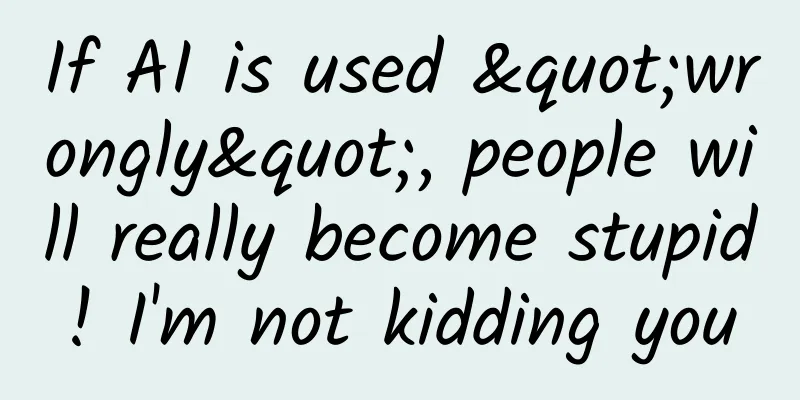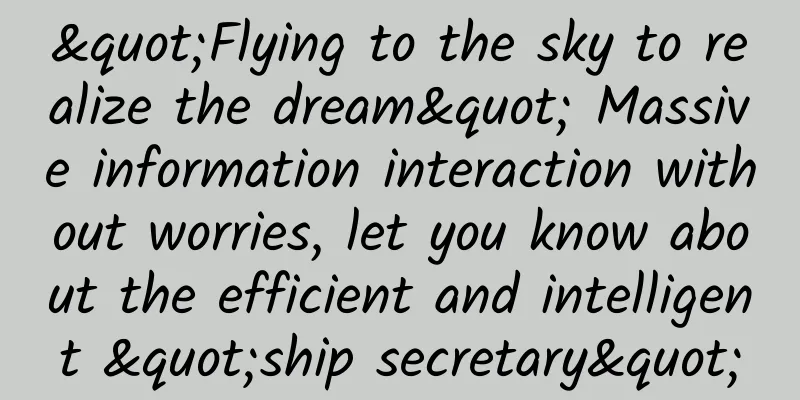If AI is used "wrongly", people will really become stupid! I'm not kidding you

|
One day in AI is like one year in the human world. In the past two years, AI technology has developed rapidly, and its penetration into our lives can be described as a thousand miles a day. From smart homes to autonomous driving, from smart customer service to AI assistants, from writing and drawing to emotional companionship, efficient and convenient AI technology is quietly changing our behavior bit by bit, improving our quality of life and work efficiency. Copyright images in the gallery. Reprinting and using them may lead to copyright disputes. Many workers like me (who dream of getting something for nothing) have begun to daydream of "painless work" - dreaming of being able to use the power of AI to complete work without putting in too much effort and enjoy life. Spending two or three hundred yuan a month to open an AI membership and outsource more than 50% of the work, who wouldn’t be tempted by this? However, while we are immersed in the convenience brought by AI, we also have to be wary of the negative effects it may bring to users : slow thinking, dependence, and laziness. Hearing this, some friends may doubt that AI is so fun to use and produces results so quickly and well, so you may be exaggerating, right? This is not an exaggeration. In the past two years, many studies have reached similar conclusions. In order to let everyone listen to both sides and understand them, we will introduce several AI-related studies and the conclusions and suggestions of scholars in "plain language". Don't worry, even if you have no basic knowledge, you can understand it. Is AI making people fall asleep at the wheel? Ethan Mollick, an associate professor at the Wharton School, published a book in April 2024 called Co-Intelligence: Living and Working with AI. The book introduces an experiment in which Mollick and his other colleagues asked the Boston Consulting Group (BCG), one of the world's top consulting firms, to assist in implementing the research. Nearly 800 consultants from the Boston Consulting Group participated in the experiment. The consultants were randomly divided into two groups, one of which worked normally in the traditional way, and the other had to use GPT-4 (OpenAI's flagship product and one of the leaders in large language models). After being trained in artificial intelligence, these consultants are free to perform 18 tasks designed by BCG, including creative tasks, analytical tasks, writing and marketing tasks, persuasive tasks, etc. These are standard tasks within the scope of work of normal consulting consultants. Guess which group did better? Copyright images in the gallery. Reprinting and using them may lead to copyright disputes. There is no doubt about the answer - the group using artificial intelligence did better. And this judgment is not subjective (a leader says you can do it, then you can do it), but the researchers used 118 different analyses, and the group using artificial intelligence still had a significant advantage. The consultants in the AI group worked faster, were more creative, wrote better, were more analytical. All of it. You might say: Isn’t this great? But the researchers found something worrying - when consultants were using AI to help them complete tasks, because the AI had already done most of the work, most of the experimental participants simply pasted the questions they were asked and then copied the AI's answers into their work results. BCG then designed a task that was carefully chosen to ensure that the AI could not come up with the right answer —one that combined tricky statistical questions with misleading data. Without AI help, human advisors were correct 84 percent of the time, but when advisors used AI, they were correct only 60 to 70 percent of the time. Why is this happening? As you are smart, you must have guessed that the consultants simply copied and pasted the answers from the AI, just like last time. It is hard to blame the consultants for taking shortcuts. Imagine if you were in this scenario and there was a standard answer that seemed "perfect" in front of you, it would be hard to restrain yourself from using it directly. Researchers have a vivid metaphor - consultants who rely too much on AI are like drivers who fall asleep at the steering wheel . Because artificial intelligence is too powerful and can complete most tasks well, humans unknowingly give AI too much trust. But if the problem exceeds the ability of AI, this trust may lead to big mistakes. Will AI teach “skilled” students or “useless” students? Artificial intelligence is being used more and more widely in the education industry, and smart college students have already used various large models to help them complete their homework. In addition, there are also intelligent software and hardware in cooperation with schools or officials, as well as some auxiliary education products provided by other commercial companies. Research on artificial intelligence in the field of education is obviously very important and necessary. Last June, a study published in the journal Nature explored the impact of artificial intelligence on decision-making loss, laziness and privacy issues among college students in Pakistan and China. The study mainly examined the learning of 285 students from different universities in Pakistan and China. The data analysis results showed that artificial intelligence significantly affects the decision-making ability of students and teachers and makes students lazy. In addition, it also brings security and privacy issues. The survey results show that 68.9% of laziness of humans (participating teachers and students), 68.6% of personal privacy and security issues, and 27.7% of decision-making errors are due to the influence of artificial intelligence. Copyright images in the gallery. Reprinting and using them may lead to copyright disputes. Teachers and students using AI technology will slowly and gradually lose interest in doing their own tasks, and will gradually lead to the loss of human decision-making power. When the use and reliance on AI increases, it will automatically limit the thinking ability of the human brain. At the same time, the use of artificial intelligence will significantly reduce real-time physical interactions and affect the educational environment between students and teachers. In a real environment, there is a lot of interaction between teachers and students, which will develop students' personality and civic literacy. For example, students can learn from other students, ask questions to teachers, feel feedback from classmates, etc., all of which are difficult to achieve with AI alone. This study argues that important precautions need to be taken before large-scale application of AI technology in education. Accepting AI without addressing the main human problem (human nature has inherent weaknesses) is like summoning the devil. It is recommended to focus on the proper design, deployment and use of AI in education to address this issue. The better the AI used, the easier it is to recruit talent? Another common application of AI is to help human resources departments screen resumes and assist in recruitment. So what is the effect? In a 2022 study published by Fabrizio Dell'Acqua, a sociologist at Harvard Business School's Innovation Science Lab, he hired 181 professional recruiters to review 44 resumes. He randomly divided the subjects into four groups, and conducted recruitment work with partners such as "perfectly predictive artificial intelligence", "good artificial intelligence", "bad artificial intelligence", and "no artificial intelligence". The results found that the subjects who used the high-quality AI evaluated job applications less accurately, spent less time and effort on each resume, and blindly followed the AI's recommendations. They also did not improve over time. But recruiters using "bad AI" put in more effort and spent more time evaluating resumes , were less likely to automatically choose candidates recommended by the AI, and were more alert, more selective, and more independent. These recruiters learned how to better interact with their assigned AI and improved their performance. This shows that high-performance artificial intelligence may "encourage" humans to be more lazy, leaving the steering wheel entirely to artificial intelligence and falling asleep in the driver's seat. Let AI help humans improve, and let humans supervise AI to be good Stephen Hawking once said that the successful creation of artificial intelligence would be the greatest event in human history. Unfortunately, unless we learn to avoid the risks, it may also be the last. It is undeniable that we humans are born with certain shortcomings, which is also an important attribute of what makes us human. When great technologies were first created, they were all intended to make up for or balance human shortcomings. The result we least want to see is that our shortcomings are getting shorter and shorter. Artificial intelligence technology was developed to benefit mankind, but as of now, it has not achieved the goal of improving humanity's own level and benefiting humanity in some aspects. As carbon-based humans with rich emotions, we are inevitably lazy occasionally, but we need to realize that when we fully trust and hand over all decision-making power to a system, we are actually making a transaction, and the hidden cost may be your endogenous deep thinking and skill growth space. (Ahem, here is a special emphasis for some students who use artificial intelligence to "submit homework", smart guys, I'm talking about you) When working with AI to improve efficiency, we should view it as a quirky teammate, not an all-knowing servant. We must remember to check for its lies and biases, its carelessness or omissions, and weigh the ethics of its decisions. Most importantly, consider which tasks are worth handing over to it and which we want to keep for ourselves. After all, if you really let artificial intelligence completely "work for you", then one day in the future, it will not be artificial intelligence that will destroy your job, but you. References [1]Ahmad SF, Han H, Alam MM, Rehmat MK, Irshad M, Arraño-Muñoz M, Ariza-Montes A. Impact of artificial intelligence on human loss in decision making, laziness and safety in education. Humanit Soc Sci Commun. 2023;10(1):311. doi: 10.1057/s41599-023-01787-8. Epub 2023 Jun 9. PMID: 37325188; PMCID: PMC10251321. [2] "Co-Intelligence: Living and Working with AI" by Ethan Mollick. Published by Portfolio, an imprint of Penguin Random House. Copyright 2024. [3] "alling Asleep at the Wheel: Human/AI Collaboration in a Field Experiment on HR Recruiters", Fabrizio Dell'Acqua, Laboratory for Innovation Science, Harvard Business School Planning and production Author: Mumu, a senior product manager majoring in mathematics at Beijing Normal University and an AI entrepreneur Review丨Yu Yang, Head of Tencent Xuanwu Lab Planning丨Ding Zong Editor: Ding Zong Proofread by Xu Lai and Lin Lin The cover image and the images in this article are from the copyright library Reprinting may lead to copyright disputes |
<<: Why do cats' eyes glow at night and in different colors?
>>: This festival-exclusive symbol of "red and green" has its origins in China?
Recommend
Tips for setting titles and covers for Kuaishou short videos!
Generally speaking, the number of views of high-q...
Weibo Fans Advertising and Charging Standards!
1. Introduction to Fantong What is Fantong? To pu...
Many reasons to tell you that the iPhone 4s is still good enough
Speaking of the pinnacle of smartphone history, A...
Nokia is back, are Nokia fans ready?
[[125942]] Although Nokia's voice in the cons...
Who will be the next player in smart TV?
Smart TVs are like magnets, constantly attracting...
Explain it to me clearly. We already have CALayer, why do we need UIView?
[[147557]] "Please explain it to me clearly....
Fighting each other is not the right solution. Domestic companies should take a look at Apple and Microsoft.
[[150371]] "We have no eternal enemies, nor ...
This mathematician proposed the idea of species evolution a hundred years earlier than Darwin!
In 1859, Darwin published his magnum opus, The Or...
The train to Shangri-La is coming! The Lixiang section of the Yunnan-Tibet Railway is about to open. What are the "check-in points" along the way?
It is reported that the Lijiang-Xiangjiang sectio...
China, a karst country
Karst landforms are widely distributed in the wor...
How to write a complete event operation plan?
This year I also tried event operation for the fi...
Social media marketing, just start from these 3 points!
Social media marketing has become the standard fo...
Mistakenly thought it was a cold, and almost lost my life! Don’t ignore these situations...
Have you ever had this experience when you had a ...
Super complete! All the advertising strategies for 2018 are here!
According to the data from the "2018 China O...
Unreal 4 data package increased by 23MB! QQ pushes Android 8.6.68 beta version
Recently, QQ pushed the 8.6.68 beta version u...







![[Creative Cultivation Program] Is there any scientific basis for the claim that spanking can improve IQ?](/upload/images/67f265d8d2f16.webp)

